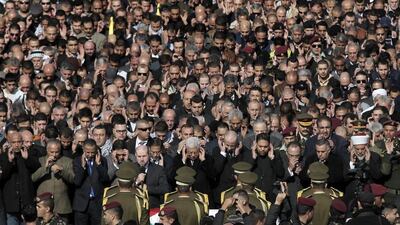RAMALLAH // A Palestinian minister who died after being assaulted and tear-gassed by Israeli soldiers was laid to rest on Thursday amid a dispute over the findings of his post-mortem.
Ziad Abu Ein was buried in El Bireh cemetery to the sound of gunfire after his coffin, draped in a Palestinian flag, was paraded across the city and kept in state at the presidential compound, or Muqata.
The Israeli military deployed more troops to the occupied West Bank in anticipation of possible unrest, but only minor clashes were reported from several protests in the territory.
Abu Ein, a senior Fatah official in charge of a commission on settlements and the Israeli separation wall, died on Wednesday following a confrontation with soldiers in Turmus Aya, a village just outside Ramallah. The minister and a group of activists had gone to the village to plant olive trees to mark Human Rights Day.
They were met with teargas, and a soldier was filmed grabbing Abu Ein by the neck. Soon afterward, the minister appeared to be out of breath and was lying on the ground. The 55-year-old father of four was later taken to the hospital, where he died.
Thousands of Palestinians took part in Thursday’s funeral procession, holding Palestinian and Fatah flags, as well as posters of Abu Ein. Some masked men also fired their weapons throughout the ceremony.
Among the mourners was Haitham Arar, the head of the Palestinian interior ministry’s Democracy and Human Rights Unit, who said Israel was responsible for Abu Ein’s death.
“His killing comes as a part of a series of escalatory measures being taken by Israel especially in the past six months,” said Ms Arar, a Fatah member.
A day after a post-mortem was carried out, Palestinian and Israeli authorities differed on the cause of Abu Ein’s death.
Pathologists from the West Bank and Jordan who carried out the examination, with an Israeli doctor observing, agreed on some of the findings. However, the pathologists disagreed with the Israeli doctor on the circumstances of the death.
The Palestinian pathologist, Saber Al Aloul, said the post-mortem showed a “narrowing of the coronary artery accompanied by bleeding in the inner lining of the heart as a result of pressure that comes with severe distress”. He said this was because Abu Ein was struck, and there was bruising on his neck to prove it.
Mr Al Aloul aslo said Abu Ein’s front teeth, tongue and windpipe had sustained some damage.
The Israeli health ministry said Abu Ein died of “blockage of the coronary artery due to haemorrhaging underneath a layer of atherosclerotic plaque [that] could have been caused by stress”.
But the statement added that the coronary blood vessels were blocked and there were indications he had previous heart attacks.
Ms Arar said the Israelis were “splitting hairs” over the autopsy results. “What does it matter if his heart was weak or not?” he said. “He was shoved, grabbed and tear-gassed. In front of hundreds. And he died as he peacefully resisted the occupation.”
On Wednesday, Palestinian president Mahmoud Abbas described the attack as “a barbaric act that cannot be tolerated”. Abu Ein’s death also sparked appeals by the US, EU and the UN for an independent investigation.
Three days of mourning were declared, and shops and schools closed in Ramallah, while the lights of the Christmas tree at Manger Square in Bethlehem were turned off.
Israel’s defence minister, Moshe Ya’alon, expressed sorrow at Abu Ein’s death. “The event in which Ziad Abu Ain died is under investigation by the IDF,” he said on Wednesday. “We have proposed a joint investigation to the Palestinian Authority. Security stability is important to both sides and we will continue coordination with the PA.”
The minister’s death sparked fresh threats from the PA to cease security coordination with the Israelis. A Palestinian leadership meeting on Friday is to discuss their response to the death, including joining international organisations and treaties.
Abu Ein had been held in Israeli and US prisons for 13 years on various charges including involvement in a 1979 bombing that killed two Israeli teenagers. He was released in 1985 as part of a prisoner exchange.
His son, Mu’taz, said Abu Ein had been active in non-violent resistance for years.
“My father was not a politician, he was a civil disobedience leader. Israel does not distinguish between non-violent and violent activities. They just want to maintain the occupation with any means necessary.”
foreign.desk@thenational.ae

